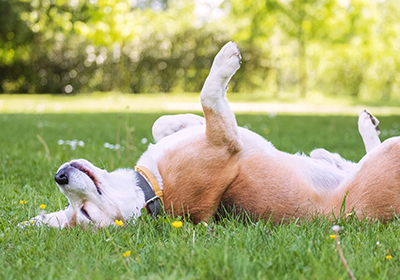While summer brings plenty of outdoor adventures and quality time spent with your pets, it also presents some unique hazards that pet owners need to be aware of.

- Beware of bees, wasps & adders
The buzzing sound of bees or wasps is synonymous with summer, but it can spell trouble for your pets. Some pets are naturally curious and may attempt to chase or swat at these insects, putting them at risk of getting stung. Keep an eye out for any signs of bee or wasp activity and discourage your pets from approaching them. If your pet does get stung, watch out for signs of an allergic reaction, such as:
- excessive swelling
- difficulty breathing
- weakness
Seek immediate veterinary attention if you suspect an allergic reaction.
Snakes, particularly Adders, are also something to be aware of when outdoors. Adders are the only one of the three species of snake in the UK that are venomous, but a bite from any snake can be uncomfortable an potentially dangerous for your pet. If possible, teach your pet to avoid snakes through exposure in controlled environments, and keep them on a lead when outdoors in unfamiliar surroundings.
If your pet has started to limp or has an area of pain and swelling around bite marks, these can be mild symptoms of a snake bite. More severe symptoms may include:
- vomiting
- panting
- weakness or unsteady movement
- severe bruising
- difficulty breathing.
If you notice any of these symptoms, even mild, get in touch with your local veterinary practice immediately.
-
Barbecue safety
Summertime often means firing up the grill and enjoying outdoor barbecues. While these gatherings can be fun, it's crucial to keep a watchful eye on your pets around the barbecue area. Grilling foods can produce enticing aromas for pets, leading them to venture too close and potentially burn themselves. If you have a charcoal or wood-fire grill, rather than a gas-based barbecue, it’s also important to know some pets can be quite sensitive to smoke. Additionally, certain foods like onions, garlic, grapes, and chocolate can be toxic to pets, and outdoor dining or picnics may make these foods more easily available. Keep them away from these foods and ensure that any food scraps or bones are disposed of safely, preventing accidental ingestion.
Find out more about barbecue safety around your pet here.
-
Beating the heat: How to keep your pet cool in the summer
High temperatures and humidity can pose serious risks to your pet's well-being. Prevent heatstroke and overheating by always providing ample shade and fresh water, both indoors and outdoors. Avoid leaving your pets in parked cars, even for a few minutes, as temperatures can skyrocket within minutes, leading to fatal consequences. Consider taking walks during cooler parts of the day and protecting your pet’s paws from hot surfaces, such as and even artificial grass, as these can heat up to high temperatures and cause burns.
-
Parasite protection
The summer months are a prime time for Fleas, Ticks, and Mosquitos. These pesky parasites not only cause discomfort but can also transmit various diseases. Mosquitoes can be a big problem for rabbits. As the number of mosquitoes increases during summer, so does their chances of biting rabbits which can transmit myxomatosis. If you’re a rabbit owner, don't forget to keep up to date with their vaccinations.
Speak to your vet about appropriate preventive measures, such as spot-on treatments, collars, or oral medications, to keep your pets protected. Regularly check your pets for ticks after outdoor activities and consider creating a tick-safe zone in your garden by trimming tall grass and bushes. You can sign up for Alder Vets Pet Health for Life Plan to get ahead of parasite prevention this summer for as little as £19 per month!
-
Water safety
If you're planning beach trips or poolside fun, it's important to introduce your pets to water gradually and under supervision. Not all pets are natural swimmers and even those who are should always be supervised near bodies of water. Provide a shaded area for them to rest, and be cautious of strong currents or dangerous underwater conditions. Additionally, rinse your pets off after swimming in pools or salt water to remove chlorine or salt residue, as it can irritate their skin.
-
Beware of plant hazards
While enjoying the outdoors, it's important to be mindful of certain plants that can pose hazards to your pets. Some plants may have thorns, sharp edges, or stinging nettles that can cause injuries or skin irritation. Be cautious when exploring unfamiliar areas with your pets, and if you notice any signs of irritation or injury, promptly examine the affected areas. Contact your vet if you suspect any plant-related issues or if your pet shows signs of discomfort.
Keep your pets safe this summer with Alder Vets
By following these essential summer safety tips, you can ensure that your furry companions enjoy a happy and healthy summer season. From protecting them from bees, wasps, and barbecue hazards to preventing heatstroke, parasites, and other plant-related risks, you can create a safe environment for your pets to thrive in. Stay informed, stay vigilant, and make the most of this wonderful season with your beloved pets by your side. If you are worried about the safety of your pet at any point, get in touch with Alder Vets, we are happy to help!






